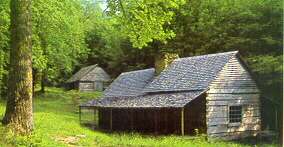Echoes From The Past
By JUDY MAUPIN
*- Echoes From the Past
(A Column of historical and genealogical anecdotes, stories and family notes.)
Calloway County, Ky.
The Battle Of Paducah
June 3, 1978
In center of the old Bowman cemetery, just off old highway 641 stands a large marker over the grave of General Albert P. Thompson. The inscriptions on the stone tell of this man's part in the Civil War of West Kentucky. It reads: "General A. P. Thompson. 3rd Kentucky Brigade. Fell at Paducah March 25,1864,pu 35 years, 22 days. In view of home, in the midst of his neighbors, he lay down his life. No country ever had a truer son, No cause a nobler champion; No people a bolder defender, No principal a purer victim. While God keeps his Soul, the people for whom he died cherish and defend his memory."
Genral Thompson, known to his friends as Bert, was born and grew up outside of Murray. He married, when young and he later took two more wives. After he had married for the third time to the daughter of a Mayfleld attorney, he moved to Paducah apd entered the law firm of Bigger, Thompson and Roe -
When the Civil War broke out,
Thompson joined Nathan Bedford
Forrest's men, commanding the Third
Brigade. This group was composed of
the third Kentucky Regiment, led by
Colonel G. A. C. Holt; the Seventh
Kentucky Regiment, led by Colonel Ed
Crossland, the Eighth Kentucky
Regiment, led by colonel Hylan B.
Lyons, and the Twelfth Kentucky
Regiment, led by the Colonel W. W.
Faulkner.
The march which ended up in the Battle of Paducah started at an encampment at Columbus, Mississippi. The men had been away from home for three years, and their ranks had been badly decimate by battle and disease, not to mention homesickness. When Forrest ordered the men to report to him with the goal of returning back to west Kentucky, it was found that there were not enough horses left to transport the men. But the soldiers were undaunted; they would willingly walk, it it meant going back home. So they set out on foot, on their way to Jackson Purchase.
The third week in March found the troops marching through Tupelo, Trenton, and Union City. There was a brief skirmish in Union City, where the Union troops surrendered to what they believed to be a great number of Confederates. This, however, was the result of the large amount of noise and confusion caused by the Rebels, who had used this trick on other occasions.
On the night of March 24, the troops pitched camp at Mayfield, preparing to move on to Paducah the following day, Good Friday. Word of their approach had already reached Colonel S. G. Hicks, who was in charge of Fort Anderson in Paducah.
Fort Anderson was a strong fort built by the federal government as a repository for food and other supplies needed by the union troops. These supplies were Forrest's goal, since they were badly needed by his men.
Colonel Flicks had patrols watching the old Mayfield road for signs of troops from early morning on through the day. About noon, the pickets sighted Rebels and the fighting began. The Confederate soldiers chased the Union ment into Paducah, firing all the way, while the Federals attempted to ga1i~ shelter at Fort Anderson, where Hicks and his men waited.
Forrest had about 1900 men in his command, and soon there was fighting everywhere. About 3:00 Thompson ordered his men to attack the fort. About 3:30 Forrest, under a flag of truce, sent a note to Hicks demanding immediate surrender of the fort, to which Hicks replied In the negative. After that, the battle begin In earnest. As Col. Thompson rode out to direct the assault, one of the cannons in the fort let loose with a cannon ball, totally decapitating him.
The soldiers then regrouped and hid behind nearby houses and trees,
picking off Union Soldiers as they appeared. By nightfall, with 11 Confederates and 14 Federals dead, Forrest's troops began to withdraw, after looting the warehouse. the men returned to Mayfield, after capturing about 50 Union soldiers and numerous horses.
It is said that after Thompson was shot, his horse ran for half a block before stopping and fallin dead.
Thompson's body lay in the streets of Paducah until the next morning, getting badly mangled by the surrounding battle. He was buried in the cemetery at Paducah, bit was later moved to the Bowman cemetery at Murray, to be buried next to his first wife.
So ended the Battle of Paducah, another Forrest's victories. It has been said of him that he never lost a battle in which he was the aggressor and organizer. I am not sure that this Is accurate, but it certainly was true with the Battle of Paducah.

